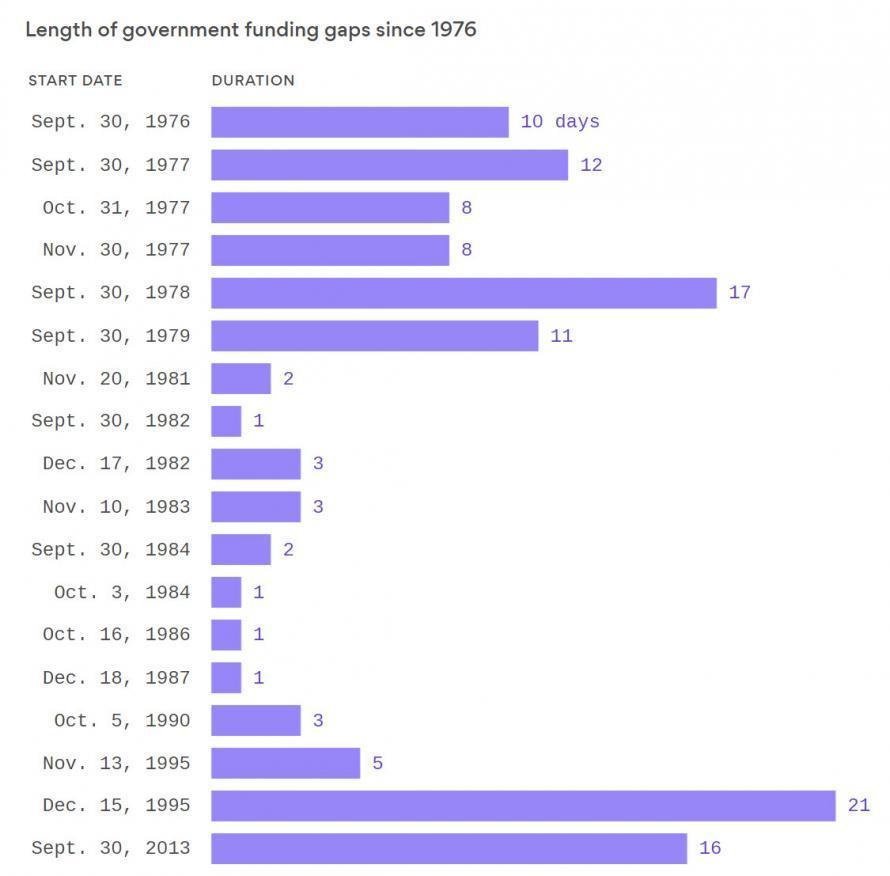After House Democrats pushed through a series of spending bills in a doomed attempt to end the shutdown (or at least crystallize their virtue-signaling in the Congressional record), the Senate decided to adjourn for the weekend on Friday without taking up debate on any of the bills (which had approximately zero chance of passing the upper chamber and being signed into law by the president), virtually guaranteeing that the partial government shutdown that is currently in its 21st day will surpass a shutdown that ended in December 1995 to become the longest in American history.
The Senate just adjourned til Monday, ensuring this will be the longest U.S. government shutdown in history
— Manu Raju (@mkraju) January 11, 2019
The shutdown is the third since the dawn of the Trump administration, but while the earlier shutdowns lasted for days or hours, this one has dragged on for three weeks already. And with Democrats refusing to accede to Trump’s demands for $5.7 billion in border wall funding, it’s possible that it could persist until Trump decides to declare a national emergency to begin construction on the border wall.
Roughly 800,000 federal workers have either been furloughed or are working without pay and have now missed a round of paychecks that were supposed to go out on Friday. Congress has passed a bill to guarantee back pay to all federal workers affected by the shutdown, and it’s awaiting a signature from the president.
But that won’t stop hundreds of thousands of workers from missing rent or mortgage payments, or falling behind on their bills or foregoing groceries.
After struggling on for weeks, the TSA said Friday that it would begin limiting security checkpoints at airports around the country, with Miami International Airport preparing to close an entire concourse. A union representing TSA employees has filed a lawsuit arguing that it’s illegal for the government to ask employees to work without pay, Bloomberg reported.
Separately, a union representing more than 10,000 air-traffic controllers filed suit in federal court in Washington on Friday, charging that it’s illegal to force them and other aviation employees to work without compensation.
The Transportation Security Administration plans to begin closing a handful of security checkpoints at airports around the U.S. as soon as this weekend in response to staff shortages triggered by a partial federal government shutdown now in its third week.
Miami International Airport expects to shut one of its concourses for several days starting Saturday afternoon and will move flights to other gates, according to a statement by the airport.
Ahead of their first missed paycheck this week, the TSA saw a spike in employees calling out sick, as more than 50,000 workers have been going without pay since Dec. 22, the day the shutdown began.
But that’s not all: Hundreds of affordable housing contracts that have expired during the shutdown mean that thousands of low-income senior citizens will go without essential services like repairs to HUD-funded homes, according to NBC News.
The few federal employees left at HUD have been scouring the books, looking for a last-minute solution to fund hundreds of affordable housing contracts that have expired under the shutdown.
More than 200 of the contracts that expired in December are for properties, like San Jose Manor II, that provide rental assistance for the elderly, according to LeadingAge, an association for nonprofit providers of aging services. Known as Section 202, the program houses about 400,000 low-income elderly people as part of HUD’s Section 8 Project-Based Rental Assistance.
Though it’s worth noting that HUD has found money to service other low-income housing contracts. Meanwhile, as volunteers have flocked to national parks to pick up trash and attend to the routine upkeep, CNN reported that vandals cut down a protected Joshua Trees in Joshua Tree national park in California.
As the fallout from the shutdown worsens, President Trump is reportedly considering a plan to use disaster-relief funding earmarked for California and Puerto Rico to order the Army Corps. of Engineers to begin building a large swath of the wall – though Congressional Republicans are split on whether this is a good idea (WSJ’s editorial board recently opined that using a national emergency as a subtext to build the wall would set a “bad precedent”).
Still, there’s at least one silver lining: Stocks have climbed more than 10% since the shutdown began – defying analysts’ warnings, though Fed Chairman Jerome Powell warned yesterday that it could negatively impact GDP growth for Q1.
In fact, according to an estimate from S&P Global Ratings, if the shutdown persists for another two weeks, the cost to the US economy will exceed $6 billion – more than the $5.7 billion Trump is asking of Congress, CNBC reported.
via RSS http://bit.ly/2AJLXI7 Tyler Durden
